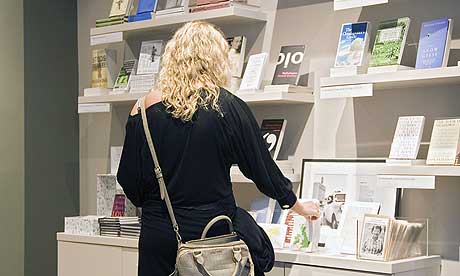
In the pubs around Charing Cross - The Angel and The Phoenix in particular - my Waterstone's colleagues and I used to drink away our wages while discussing what we saw as the sad decline of the bookstore chain we loved. How soulless it had become, how centralised buying was killing the art of bookselling, and, inevitably, how it would be so much better if we were in charge. It was usually then that we'd start bouncing around ideas for the perfect bookshop, stores that were far removed from the increasingly corporate Waterstone's ethos and in all truth, far removed from any kind of business reality. Or at least so I thought.
When I came across The School of Life, an artfully designed shop situated in the centre of the tourist encrusted streets of Russell Square, it seemed to me like one of those late night drinking sessions made of bricks and mortar. It styles itself as a pharmacy for the mind; a place of repose and thought amongst the hurdy gurdy of modern life. Personally, this kind of self-help gubbins leaves me cold, and despite the appealing store furnishings, I couldn't help but feel oppressed by the smugness of the whole affair.
The walls advertise £195 courses on big subjects such as love, family and politics, all fronted by members of The School of Life faculty – a number that includes such luminaries as Alain de Botton and Robert Macfarlane. I looked at the descriptions with mounting incredulity until I noticed the advertisement for the next School of Life dinner, which provides the diners with conversation menus – an idea that Monty Python lampooned in their final feature film The Meaning of Life.
These things aside, I was interested by two of the school's better ideas. The books on sale in the shop are arranged thematically, and there is a very limited choice. The subjects are interesting – books to read when you've fallen hopelessly in love, books to better understand your children – the choices, however, are rather dull. It doesn't help that de Botton's books appear in almost every category. The limited range is a superb antidote to the bigger is better maxim, but it's only as good as the books you select; the ones that I saw appeared rather homogenous, the same kinds of authors, the same kinds of jackets.
The idea that really marks out The School of Life from other book enterprises is their recommendation service, Bibliotherapy. For £50 - excluding books - a specialist will help you choose books perfectly suited to you; a sort of literary personal trainer, if you will. To my mind, it's a great idea. With so few of us near a bookseller of experience and understanding, it's the perfect way to pick your way through the minefield of what to read next.
Obviously it's dependent on the quality of the person recommending the books, but the idea of an independent professional being on hand to assist has always been a staple of my ideal bookshop. While other aspects of The School of Life appear faddish and self-gratified, Bibliotherapy could well be the future. As they say themselves: "A new book is published every 30 seconds, and you would need 163 lifetimes to get through all the books offered on Amazon." For those that don't want to waste time on books that are well reviewed but do nothing for them, this very personal shopper method could help people find books they wouldn't ordinarily pick up.
I wish The School of Life all the luck in the world (they're really going to need it), but at the same time I can't help but feel nostalgic for the days when such a service came as standard in bookshops, and wasn't chargeable at bijou boutiques in central London.

